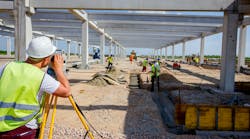Despite supply chain issues, worker shortages and the slow recovery from the COVID-19 pandemic, there’s still an impressive array of mega construction projects of $500 million underway or on the drawing boards. Much of the action is in the new construction of electric-vehicle (EV) manufacturing plants and EV battery plants and data centers.
Many of these projects will drive big-time growth in the industrial market, which is currently one of the most active segments of the construction business through February 2022, according to the Department of Commerce’s Value of Construction Put in Place data. This data shows that private construction in the industrial arena is up 35% to $96,552 million.
Richard Branch, chief economist for Dodge Construction Network, said in a Dodge press release that the industrial market has been one of the strongest areas of the construction market since the pandemic began. “Domestic producers are expected to seek more control over their supply chains in the future, so that aspect of construction should continue to flourish,” he said in the press release. “However, as evident in February’s data, other sectors are struggling to gain traction in the face of high material prices and worker shortages. The conflict in Ukraine will continue to put upward pressure on costs, making the sector’s recovery more tenuous in 2022.”
Let’s take a look at the mega projects that will provide the most revenue opportunities for the electrical construction market in the near future.
EV AUTO & BATTERY PLANTS
Over the next few years, the construction of electric vehicle factories, EV charger plants and EV battery manufacturing facilities will support no less than $25 billion in new construction and renovations of existing facilities, according to EC&M research. When you consider that electrical construction materials typically account for 10% of a construction job, these plants will provide electrical manufacturers, contractors, distributors, reps, design firms and other channel partners with more than an estimated $2.5 billion in electrical work.
The ground is yet to be broken on most of these facilities, but Tesla is reportedly nearly finished with its $1 billion Gigafactory in Austin, TX, that will produce its Model Y, Model 3 EVs, and eventually its Cybertruck. Tesla’s rivals, Ford and GM, are all-in on electric vehicles and over the past year announced plans for new plants or expansion of existing facilities. Ford will be spending $11 billion on new battery plants in Kentucky and Tennessee, and GM recently announced its intentions to invest $7 billion in a new battery plant in Michigan and retrofit an existing facility in the state to produce electric pickup trucks by 2024.
Along with projects being planned by these well-known players are some mega projects on the drawing boards with smaller companies as well. In 1Q 2021, Australian EV charging company Tritium announced plans to build a factory in Lebanon, TN, that will eventually be capable of manufacturing up to 30,000 DC chargers annually.
DATA CENTERS
LOOKING FORWARD
With supply chain pressures and the worker shortages, don’t be surprised if some of the projects mentioned in this article or listed in the table below are delayed or postponed indefinitely. But enough of them are already underway or close enough to groundbreaking that electrical contractors and other electrical professionals should start seeing a surge in new revenue opportunities in the industrial, renewables, energy storage and data center market niches.
If more companies bring their manufacturing back to the United States from offshore locations, it would spark a surge in industrial construction not only in mega projects for the electric vehicle, EV battery and data center industries, but in projects of all sizes across industrial America. That could be very good news for the electrical construction market.
ABB provides customers across various industries with end-to-end products and solutions that are cleaner, smarter, and more efficient without compromising safety or reliability. ABB is leading the future of electrification with advanced technologies and equipment to protect and control the distribution of electricity throughout a facility’s infrastructure. Explore ABB’s comprehensive electrical offering today.
Sponsored by:





